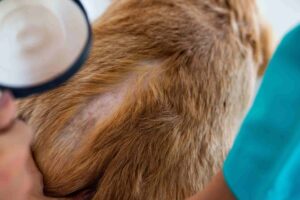Zinc supplementation within the treatment protocol for canine leishmaniasis promotes a faster and more effective response to therapy, according to the results of an Italian prospective study
In Mediterranean countries, dog leishmaniasis is an endemic disease with a prevalence ranging from 2 to 5 percent. The parasite that causes it, Leishmania infantum, is widespread and is estimated to be present in up to 80% of dogs.
Leishmaniasis can occur in various forms, including severe forms, or remain in the subclinical stage, and at present, response to available therapies is variable and relapses are not uncommon, so that lifelong follow-up after treatment should be maintained.
Therapeutic success depends on the ability of the treatment to induce an effective cellular immune response. Zinc plays a particularly important role in the immune response to disease: its deficiency, in fact, interferes with the functions of the immune system through several mechanisms, particularly leading to selective reduction of Th1 cytokines and enhancing the humoral response, resulting in decreased interferon production; this mechanism may result in the clinical manifestations of leishmaniasis. In fact, some studies have indicated low serum zinc levels in dogs with leishmaniasis.
Zinc supplementation, therefore, could be useful in the course of leishmaniasis treatment.
Therapeutic protocols with or without zinc addition: the study
A group of Italian researchers conducted a prospective study to evaluate the effects of oral zinc administration during the treatment of leishmaniasis in 18 dogs with established Leishmania infantum infection.
The dogs ranged in age from 1 to 9 years, weighed between 12 and 34 kg, and came from areas in southern Italy where the disease is endemic.
At inclusion in the study, dogs were randomly assigned to three different treatment groups: the first (referred to as the MA group), consisting of 6 dogs, received meglumine antimoniate at a dosage of 50 mg/kg subcutaneously twice daily for 30 consecutive days in combination with allopurinol at a dose of 10 mg/kg orally twice daily for 7 months; the second group, consisting of 5 dogs (MZ group), was treated with 50 mg/kg meglumine antimoniate subcutaneously twice daily for 30 consecutive days, in combination with zinc supplementation at 2.2 mg/kg per day orally for 12 months; the third group (MAZ group), consisting of 7 dogs, received the same treatment as the first group (MA: meglumine antimoniate plus allopurinol), but supplemented with zinc at 2.2 mg/kg per day orally for a total period of 12 months.
Participants were checked with clinical, blood, and urine tests at baseline and then at 30, 60 at 90, 150, 210, and 360 days. Appropriate clinical and skin scores and the values of some biochemical markers in the blood were used for evaluation: hemoglobin, albumin, gammaglobulin, and the albumin/globulin ratio.
Dogs in the latter two groups (MZ and MAZ) showed more significant and earlier improvement in clinical and skin scores than dogs in the control group (MA group).
Regarding blood markers, in dogs in the MAZ group, the values improved more and earlier than in the other groups: this suggests that the benefits are more significant when zinc is administered together with allopurinol.
Preliminary but promising results
“The results of the study indicate that oral zinc supplementation in the standard treatment protocol for leishmaniasis in dogs results in increased serum zinc concentration, with Possible benefits in terms of faster response to therapy and prolonged disease-free interval in treated animals” the researchers comment. “These data are promising regarding the contribution of supplemental oral zinc intake to improve the efficacy of leishmaniasis treatment in dogs, but further confirmation in a larger population is needed.”
Reference
Paradies P, Lubas G, Iarussi F, et al. Comparison of standard protocols for the treatment of canine Leishmaniasis in an endemic area with and without zinc oral supplementation. Ann Clin Cytol Pathol 2017;3(4):1066.







